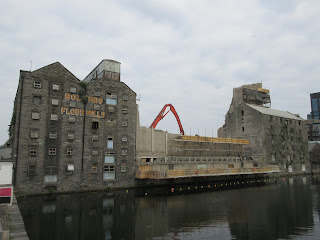To
know a city, one must walk the city. All too often while traveling, we tend to
stick to the main thoroughfares that are frequented by tourists. This is true even
while walking. There are interesting
sites, restaurants and pubs out of the way, hidden in neighborhoods and side
streets. It is true that there are no magnificent structures in these area; if
there were, then people would be flocking there. Nevertheless, if you are interested
in how people live, take the unfamiliar street or alley.
I
began to explore the Ringsend section of Dublin; an area I have neglected on
previous visits. It has long been an area that was out of fashion. It was a
warm Saturday afternoon in June. People were enjoying the weather the weather
out of doors. Most people I spoke to expressed it as uncommonly good. There
were several people sunbathing in Ringsend Park. As the evening wore on, people
began to fill up the outdoor seating areas of pubs and restaurants to dine and
drink alfresco. I was well outside the tourist area of Dublin and there was an
air of ease that surrounded the chatter and laughter.
 |
| Demolition of the Boland Flour Mills |
Currently,
Ringsend is undergoing a transformation from industrial dockyards to a more
gentrified area with waterside apartments and office space. Most of the old Boland
Flour Mills factory is being demolished and redeveloped. The front portion of
the factory appears to salvaged as part of a new condominium front.
While
there is a great deal of revitalization, old row-houses, showing the hallmarks
of working class lives, can still be easily found adjacent to Ringsend Park.
Despite the ongoing gentrification, it was clear it has not affected many side
streets and buildings. There is still an uneasy edge to the Ringsend area. Poverty
and jobless people are easy to spot. Despite the numerous “ban the poo” signs
that dot the area, the sidewalks are a veritable land mine of dog feces. Some
roads, especially away from the new and refurbished buildings, are in need of
repair. When two cyclists were making their way around the dock, the male
commented to his female companion, “The ramps (speed bumps) are smoother than
the road.”
As I
was walking along the River Dodder, I watched nine or ten boys playing in a
small patch of grass near a housing estate. It was not unlike some of the games
in which I participated growing up. One vociferous boy got the others
organized. By the time I could see and understand what was going on, it was all
too familiar. The boys had placed nerf guns into a pile and formed a circle, at
varying paces back, around the toy armaments. The lead boy gave a countdown
from ten. When he reached zero, the boys all rushed forward to grab a gun. In
the ensuing scrum, there was lighthearted wrestling and each emerged with a
weapon and had a minute to secure a defensive position for the impending
battle. I did not stay for the outcome, but I feel sure that the lead boy would
have fared well.
 |
| The Grotto on Margaret Place |
At
the end of Margaret Place, a small cul-de-sac in near the Aviva Arena, there is
a small grotto. I found the message at the base a sweet message of neighborly fealty.
The grotto is dedicated to Kathleen Crowe who had tended Mary for many decades
until her death in 2009. Someone in neighborhood has been continuing in the
care of the Grotto.
No comments:
Post a Comment